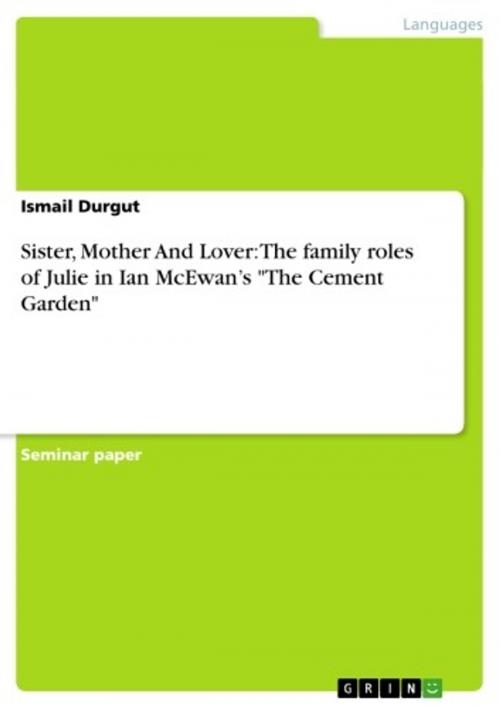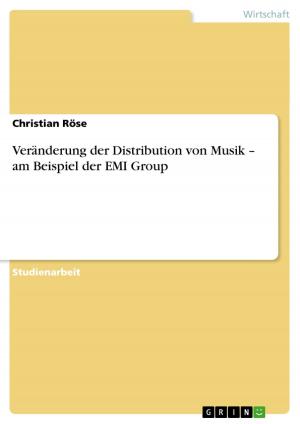Sister, Mother And Lover: The family roles of Julie in Ian McEwan's 'The Cement Garden'
Fiction & Literature, Literary Theory & Criticism, British| Author: | Ismail Durgut | ISBN: | 9783640403219 |
| Publisher: | GRIN Verlag | Publication: | August 18, 2009 |
| Imprint: | GRIN Verlag | Language: | English |
| Author: | Ismail Durgut |
| ISBN: | 9783640403219 |
| Publisher: | GRIN Verlag |
| Publication: | August 18, 2009 |
| Imprint: | GRIN Verlag |
| Language: | English |
Seminar paper from the year 2009 in the subject English - Literature, Works, grade: 2.0, University of Duisburg-Essen, language: English, abstract: In [Ian McEwan's] The Cement Garden a prominent interpretative signpost is bestowed by the literary allusion to the story tradition in which children are put into a situation in which they must fend for themselves. The key reference here is to William Golding's Lord of the Flies, a pessimistic tale of savage that emerges within the child when free of social controls. However, the children in McEwan's novel are not entirely cut from society. They try to keep their sense of family together by entombing their dead mother in concrete in the cellar of their isolated house. Moreover, all of them are influenced by adult codes of familial behavior. These codes become distorted in their independent existence, a process that culminates in the incestuous involvement of the eldest siblings. While Sue, the younger sister of the first-person narrator Jack, does not change visibly, Jack himself runs through a metamorphosis in terms of hygiene and outward appearance as such. Tom, the youngest, starts dressing up as a girl and later on behaves like a toddler and Julie, the eldest, takes over the responsibility for the others and turns from sister to mother. At the end of the story, she even becomes Jack's lover. The following paper will discuss the different family roles of Julie. First, there will be a chapter on how Jack views his elder sister. This shall function as an overview of Julie's character. The main part of this paper will present Julie's changing family roles from sister to mother and finally to lover. The oedipal theme linked to that, will not be made a subject of discussion in this paper. A conclusion will follow the summary in the final chapter.
Seminar paper from the year 2009 in the subject English - Literature, Works, grade: 2.0, University of Duisburg-Essen, language: English, abstract: In [Ian McEwan's] The Cement Garden a prominent interpretative signpost is bestowed by the literary allusion to the story tradition in which children are put into a situation in which they must fend for themselves. The key reference here is to William Golding's Lord of the Flies, a pessimistic tale of savage that emerges within the child when free of social controls. However, the children in McEwan's novel are not entirely cut from society. They try to keep their sense of family together by entombing their dead mother in concrete in the cellar of their isolated house. Moreover, all of them are influenced by adult codes of familial behavior. These codes become distorted in their independent existence, a process that culminates in the incestuous involvement of the eldest siblings. While Sue, the younger sister of the first-person narrator Jack, does not change visibly, Jack himself runs through a metamorphosis in terms of hygiene and outward appearance as such. Tom, the youngest, starts dressing up as a girl and later on behaves like a toddler and Julie, the eldest, takes over the responsibility for the others and turns from sister to mother. At the end of the story, she even becomes Jack's lover. The following paper will discuss the different family roles of Julie. First, there will be a chapter on how Jack views his elder sister. This shall function as an overview of Julie's character. The main part of this paper will present Julie's changing family roles from sister to mother and finally to lover. The oedipal theme linked to that, will not be made a subject of discussion in this paper. A conclusion will follow the summary in the final chapter.















